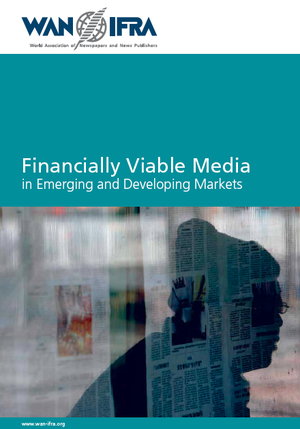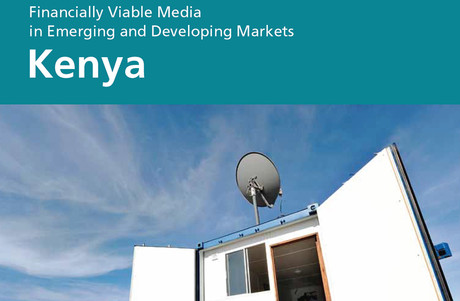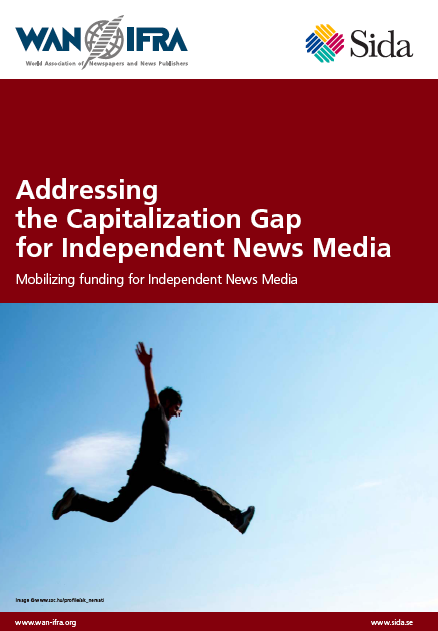"Developing Financially Viable Media in Emerging Markets" is based on an unprecedented survey of more than 220 individual newspapers and media executives in more than 60 countries in Africa, Asia, Europe and the Americas, and on five in-depth country studies. The research investigates the relationships between media freedoms, financial sustainability of media in emerging markets, and international development support.
The report, released on Wednesday (8 June) to donor agencies and media development experts at a seminar at the Organisation for Economic Cooperation and Development in Paris, identifies the challenges and opportunities for independent media in achieving financial sustainability while maintaining editorial independence. The new report can be downloaded below.
A separate report on social investment in media, also presented Wednesday, can be found at http://www.wan-ifra.org/node/36148/ . Both reports were produced in a strategic partnership between the World Association of Newspapers and News Publishers (WAN-IFRA) and the Swedish International Development Cooperation Agency (Sida).
“WAN-IFRA is taking a fresh look at media development, investigating the business perspectives of media executives who operate in less favourable market environments," said Mirjana Milosevic, the director of the project for WAN-IFRA, speaking at the seminar organised by the OECD, The World Bank Institute, Internews and the BBC World Service Trust.
"The research findings offer a valuable tool for both media and the international donor community. It offers a major contribution to efforts to sustain the independent media that is crucial to building more democratic and prosperous societies,” she said.
The combination of broad surveys and in-depth studies revealed several surprises:
- Although censorship and violence against journalists still occur in numerous places, many other countries have shaken off the political controls of the past and are operating with unprecedented freedom. But many media managers and editors in developing countries find they are unable to take full advantage of their new freedoms because they lack basic skills in business management.
- Leading editorial managers in many regions say they have greatly benefited from media development assistance in the past. But mounting economic pressures make it more difficult to sustain their hard-won advances on the editorial front. These managers see the need for a shift in media assistance that will help them build a solid, sustainable economic foundation to support the creation of quality content, increasingly on multiple platforms.
- Digital media are sweeping the globe, but in different forms and at different paces, depending on region, culture, and economic conditions. Their impact on legacy media also varies wildly: from deteriorating the business model of newspapers in North America, to boosting record profits for many news organizations in Latin America. In the spirited debate taking place around media innovations, some parties have been tempted to describe legacy media and online media as adversaries. This report makes it clear that they can be complementary, each offering services the other cannot.
The research results indicate that media executives see the greatest opportunities in three principle areas: investing in new technology and multimedia operations; developing journalists’ skills; and enhancing the skills of staff in commercial departments to improve revenue and efficiency over the next three years.
The study's principal researcher was Anne Nelson, Adjunct Associate Professor of International and Public Affairs at Columbia University in New York.
The Swedish International Development Cooperation Agency (Sida) and WAN-IFRA conduct an ambitious strategic partnership to advance media development and press freedom worldwide. The partnership allows WAN-IFRA to broaden and develop its press freedom and media development activities to support free and financially sustainable media worldwide. For more on this work, please consult http://www.wan-ifra.org/microsites/media-development
WAN-IFRA, based in Paris, France, and Darmstadt, Germany, with subsidiaries in Singapore, India, Spain, France and Sweden, is the global organisation of the world’s newspapers and news publishers. It represents more than 18,000 publications, 15,000 online sites and over 3,000 companies in more than 120 countries. Its core mission is to defend and promote press freedom, quality journalism and editorial integrity and the development of prosperous businesses.
Inquiries to: Larry Kilman, Deputy CEO and Director of Communications and Public Affairs, WAN-IFRA, 96 bis, rue Beaubourg, 75003 Paris France. Tel: +33 1 47 42 85 07. Fax: +33 1 42 78 92 33. Mobile: +33 6 10 28 97 36. E-mail: larry.kilman@wan-ifra.org





